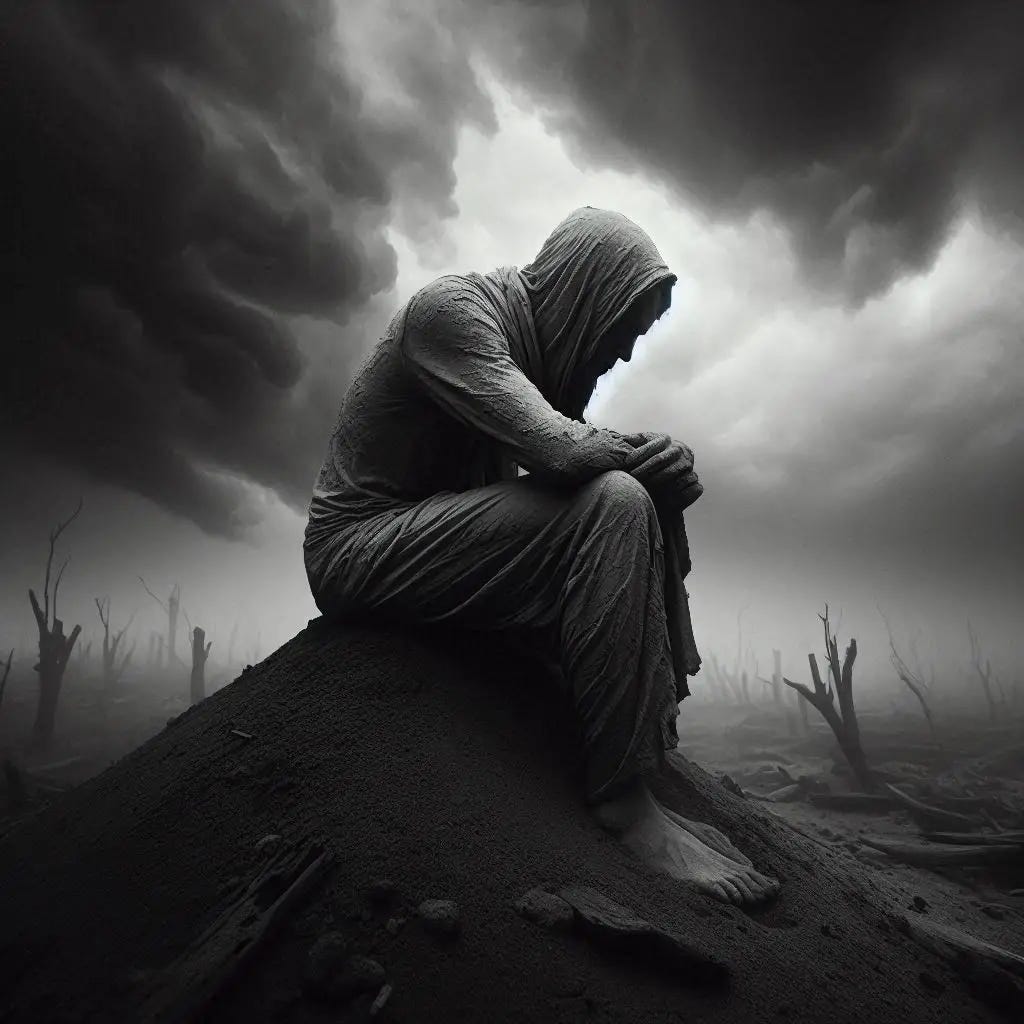You were born with the capacity to feel deeply—this is not your weakness, it is your power.
In a world that often asks us to minimize, manage, or hide our emotions, the ability to feel fully is a profound strength. Anger, grief, sorrow—these are not signs of failure or lack of faith. They are signs that you are alive, awake to the reality of love and loss, aware that existence brings both radiance and ruin.
When Job sat on the ash heap, scraping his wounds, surrounded by silence and grief, he did not pretend. He did not perform. He poured out his rage and sorrow with unflinching honesty. That kind of emotional truth-telling is rare and sacred. His words were not polite; they were raw and honest: a cry to unmake the day he was born. And in doing so, he invited something deeper into the world—a truth unfiltered by fear or shame.
You do not need to rush past your feelings to get to some supposed spiritual clarity. There is no need to jump to meaning before mourning has had its voice. Emotions are not problems to be solved; they are pathways to insight and transformation. They move through the body like weather, and when allowed, they pass. When resisted, they linger in disguise.
Feeling deeply leads to knowing deeply. You become trustworthy to yourself. You gain the kind of understanding that does not come from the intellect alone. You stand with those who suffer, not with answers, but with presence. This is how your inner world aligns with a more expansive truth.
Trust what moves through you. Let it speak. Let it be heard. That is how healing begins. That is how wholeness emerges—not in spite of the pain, but because you did not turn away from it.
Some days the weight is too much—the betrayal too sharp, the loss too overwhelming, the silence too loud. You try to push through, to find the light, but all you feel is the heaviness in your chest. The mind spins, your spirit sinks, and the well-meaning voices around you speak words that cannot reach the depth of your pain.
This is where many turn inward and shut down. We are told to be strong, to move on, to stay positive. But no one tells us how to sit still on the ash heap, how to speak the truth of our sadness without apology. We live in a culture that fears despair, yet it is often in that very place that something human and holy is revealed.
When Job cried out for the day of his birth to be erased, he was not cursing life itself—he was naming the unbearable contradiction of being alive in a world that wounds us. In that cry, he stood in solidarity with all who suffer without explanation. His pain did not isolate him; it made him one with the sorrow of humanity.
The implications are beautiful and practical: when you allow yourself to feel grief, you become more real. You stop pretending. You start listening. And through that, you gain the ability to walk with others who feel lost. Your pain, honestly faced, becomes a bridge to deeper connection, not a wall.
Do not be afraid of your dark nights. They are not signs of failure. They are invitations to honesty. They are part of the path toward a more grounded, compassionate life. Not every day will feel heavy, but the ones that do are worthy of being honored, not hidden.
You are not broken for feeling this way. You are human. And in that humanity is a doorway to wisdom.
Deeper Reflection:
When was the last time I allowed myself to fully feel, without judgment or needing to fix anything?
Heart of the Message:
Our willingness to feel and express despair opens the way to deeper understanding, healing, and solidarity with human suffering. Emotional honesty is necessary for spiritual wholeness.
Let the silence come,
the silence that does not fix but listens.
Let the anger come,
not to destroy but to name what has been torn.
Let sorrow speak
without rushing to end it.
Let the heart crack open
because there is something inside worth seeing.
This is not weakness.
This is not the absence of faith.
This is the sacred act
of being alive
and not turning away.




